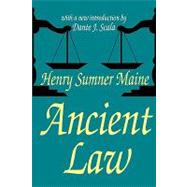Ancient Law
, by Maine,Sir Henry Sumner- ISBN: 9780765807953 | 0765807955
- Cover: Nonspecific Binding
- Copyright: 5/31/2001
Best known as a history of progress, Ancient Law is the enduring work of the 19th-century legal historian Henry Sumner Maine. Even those who have never read Ancient Law may find Maine's famous phrase "from status to contract" familiar. His narrative spans the ancient world, in which individuals were tightly bound by status to traditional groups, and the modern one, in which individuals are viewed as autonomous beings, free to make contracts and form associations with whomever they choose. Maine's dichotomy between status-based societies and contract-based societies is a variation on a theme that has absorbed the social sciences for a century: the distinction between Gemeinschaft (community) and Gesellschaft (society). This theme has been elaborated upon by such eminent scholars as Tönnies, Durkheim, Weber, Simmel, and Parsons. Along with many lesser scholars, they have considered what we gained and what we lost when we left behind a social world held together by communal, primordial bonds, and adopted one based upon impersonal temporary agreements among individuals. Maine wrote Ancient Law to increase knowledge about the internal mechanics of developing societies. He felt a key objective was better understanding of how law develops over time. Failure to understand temporal processes in relation to legal development, he argues, leads to the creation of false dichotomies. The most important of these is the alleged division between the ancient and the modern, which Maine described as an "imaginary barrier" at which modern scholars feel they must stop and go no further. Maine's desire to breach this barrier led him to present this complex and richly nuanced analysis of legal evolution. This book will be of interest to historians, political philosophers, and those interested in the development of law.






